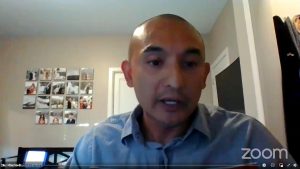Long-term care webinar for Filipino nurses
Long-term care webinar for Filipino nurses

Resource Speaker Dan Buenaventura
By Michelle Chermaine Ramos
LJI Reporter
The Philippine Reporter
On August 25, 2022, the Philippine Consulate General in Vancouver held a webinar on Health Assessment in the Canadian Health Setting, which is the first of a series of free refresher webinars for Philippine registered nurses. The series is part of the Philippine posts in Canada’s efforts to help Philippine educated nurses earn their credentials to practice in Canada to help supply qualified nurses in the current healthcare worker shortage.
“This is a long process and we all have to invest in the process. This is not something that will be handed to us. They need us and we are trying to make the point that they need us, but we also have to show that we are willing to do what it takes to be able to meet the standards that are demanded of us,” said Consul General Maria Andrelita Austria.

Consul General Maria Andrelita Austria
The session was hosted by Deputy Consul General Arlene Magno and resource speaker, Dan Buenaventura lectured on the patient health assessment process, the difference between nursing here versus in the Philippines and common misconceptions about working in long-term care.
Buenaventura graduated from the University of Santo Tomas with his BSN in 2003 and worked at the UST Hospital for three years as a staff nurse before he became a faculty member of the UST College of Nursing in 2006. He earned his Master of Arts in nursing from the UST Graduate School in 2010 and move to Manitoba in 2012 to become an instructor at the Robertson College in Winnipeg. In 2014, he obtained his license as a Licensed Practical Nurse (LPN) and as Registered Nurse (RN) in 2015. Since 2015, he has worked in various settings as a clinical education facilitator, nurse manager, and is currently a staff nurse at the Health Sciences Centre in Winnipeg which is the trauma center for Manitoba and the Center for Aboriginal Care. He is also a travel nurse.
Differences between nursing in Canada and the Philippines

Deputy Consul General
Arlene Magno
While reviewing the procedure of conducting health assessments in Canadian hospitals, Buenaventura explained that in his 19 years of experience working as a nurse in both countries, he noted some differences in the nursing role. According to him, nursing in the Philippines is a little bit more of a bureaucratic doctor-led landscape and while nurses have gone through in-depth education in conducting health assessments, they generally don’t get to use much of that training very often.
While patient care in Canada is also doctor-led, it is more collaborative. Registered nurses can make decisions to consult other members of the healthcare team such as physical therapists, occupational therapists, social workers, home care coordinators, speech language pathologists, pharmacists, etc. Each member plays a role in achieving wholistic patient care.
“A very big difference is a lot of us who came from tertiary hospitals back home are really dependent on what the doctor would say and what the doctor would think. It’s the other way around. In here, the doctor would ask you what assessment findings have you already found regarding the problem that you are telling me and what have you done so far with the patient? Because if you’re just telling me that the patient has a right upper quadrant pain, we would not be able to go further from that,” Buenaventura explained.
Cultural sensitivity in nursing in Canada’s diverse population
The lecture covered how nurses should address cultural beliefs, language barriers, how a patient’s environment contributes to or affects the patient’s current and future health, possible safety issues for the patient or other people, as well as mental health and social support.
According to Buenaventura, Canada’s melting pot of various cultures and subcultures have a variety of beliefs surrounding healthcare which can affect how a nurse is able to acquire the information they need from their patients and how their care plans canl be implemented.
He advises nurses to be culturally aware and sensitive, to avoid judgements and misconceptions, and to focus on proper response and communication techniques for them to be better able to advocate for their patients. “Because you can come up with all the best nursing diagnosis and come up with the very, very good nursing care plan, but if your patient does not believe in what you are about to do, then of course you don’t get the participation of the patient and that greatly affects the outcome of the treatment,” he explained.
Culture shock of long-term care
Another bit of culture shock for Filipinos in Canada is the concept of long-term care or nursing homes. The idea of putting loved ones in nursing homes might seem taboo or inhumane to Filipinos because culturally, Filipinos feel a sense of obligation to personally take care of older family members who took care of them when they were younger. However, compared to life in the Philippines where one family member might be willing to give up his or her job to take care of an elderly relative, help is much easier to access there than it is in Canada. It is also more expensive to pay for private help here compared to back home.
Buenaventura said that Filipino nurses should consider the culture here and think about why long-term care homes exists and that it does not denote the family members’ lack of love or empathy. He explained that it is a service they access so that their loved ones can receive the services they need especially those they cannot provide themselves.
That way, that their loved ones can live comfortably and be more functional in the remaining years of their lives, especially those with multiple chronic care problems.
Misconceptions in long-term care nursing
Buenaventura said that many Philippine trained nurses are hesitant to work in long-term care because they are afraid of losing a lot of their skills. On the contrary, he said that this is a common misconception. “You don’t actually lose a lot of your nursing skills, but you actually gain different skills that you cannot find in others that you’re not going to be using in other healthcare facilities,” he said.
Health assessment is a vital skill that every nurse who plans to practice in Canada is required to perform all the time as it is a huge scope of the registered nurse’s practice. In a long-term care setting, it is more challenging to assess patients/residents with cognitive impairment or dementia who cannot describe how they are feeling compared to patients with full cognitive function to express themselves. Therefore, long-term care nurses learn to have a keen sense of what is normal for their patients to identify any changes in their healthcare status.
Another important nursing skill they develop on the job is the skill to communicate with the residents and their family members who are the nurses’ biggest allies in caring for the residents. “If you’re working in an acute care facility, you would have five to six patients for example in a normal acute care setting. In a long-term care, you would have around 25 to 30 residents and each resident has their own family members that you would have to deal with on a regular basis. So, you’re not only nursing for your resident but you’re also nursing for the family members. The needs of the family members. Their needs that they need to convey to you on how to better the delivery of care of their loved ones who are under your care,” Buenaventura explained.
The session ended with him going over a sample case scenario similar to how an Objective Structured Clinical Examination (OSCE) is conducted. He also advises nurses to expand their networks, find and share resources and to review and practice case scenarios with their fellow IENs (internationally educated nurses) to prepare for the exams.
The webinar can be viewed on the Vancouver Philippine Consulate General’s Facebook Page here: https://www.facebook.com/philippine.consulategeneral/videos/590985876028529/
To sign up for future sessions, follow the Vancouver Philippine Consulate General’s Facebook page at https://www.facebook.com/PHinVancouver
Also, there are various Filipino nurses associations in different provinces who are conducting review sessions and offering support for foreign-trained nurses. Read the recent related stories about these organizations’ initiatives in previous issues in the links below.
———————————-
SEE RELATED STORIES:
Credentialing barriers discussed in PH embassy meet with Pinoy nurses
https://philippinereporter.com/index.php/2022/08/26/credentialing-barriers-discussed-in-ph-embassy-meet-with-pinoy-nurses/
63% of health workers experience workplace violence
https://philippinereporter.com/index.php/2022/08/26/63-of-health-workers-experience-workplace-violence/
What the community should do to support healthcare workers
https://philippinereporter.com/index.php/2022/08/26/i-nterview-what-the-community-should-do-to-support-healthcare-workers/
Healthcare worker shortage: Predicted but not prevented? What to do?
https://philippinereporter.com/index.php/2022/08/12/healthcare-worker-shortage-predicted-but-not-prevented-what-to-do/
Filipino Nurses Association of Quebec resources for internationally trained nurses
https://philippinereporter.com/index.php/2022/08/26/filipino-nurses-association-of-quebec-resources-for-internationally-trained-nurses/
Quebec’s Bill 96: Language law creates barriers to immigrant, indigenous, other groups
https://philippinereporter.com/index.php/2022/07/22/quebec-s-bill-96-language-law-creates-barriers-to-immigrant-indigenous-other-groups/
Nurses say Supervised Practice Program is ‘a good move’
https://philippinereporter.com/index.php/2022/04/22/nurses-say-supervised-practice-program-is-a-good-move/
Comments (0)